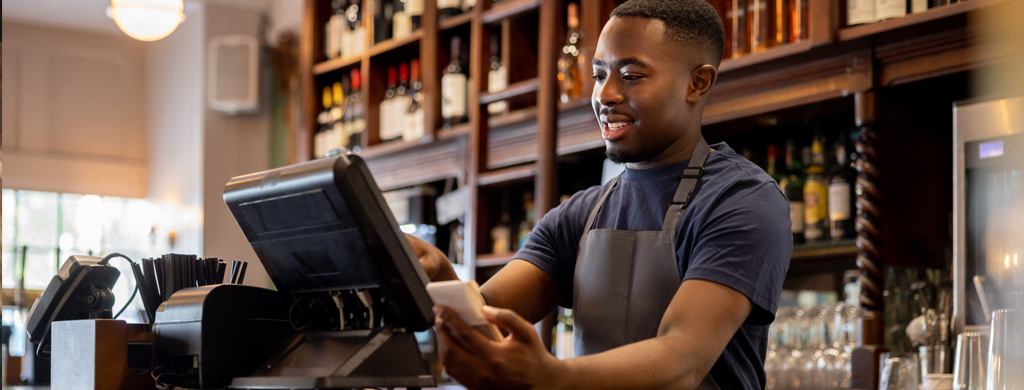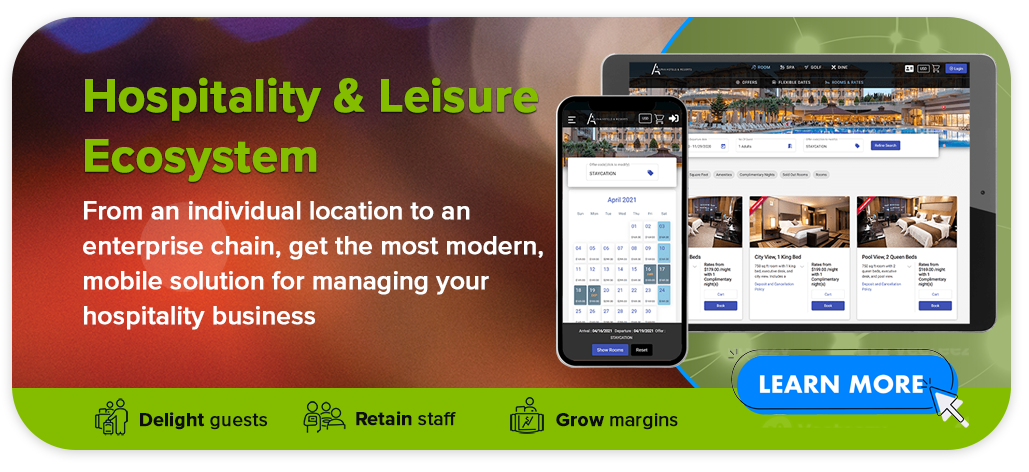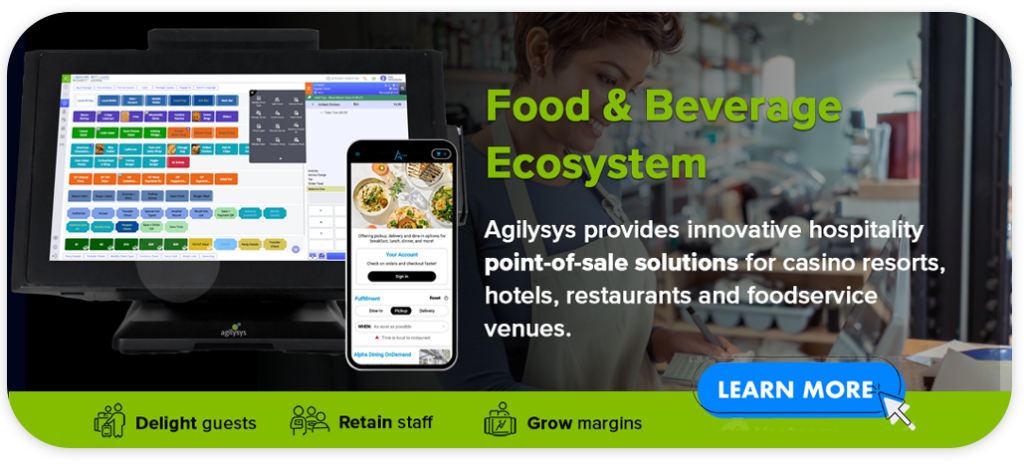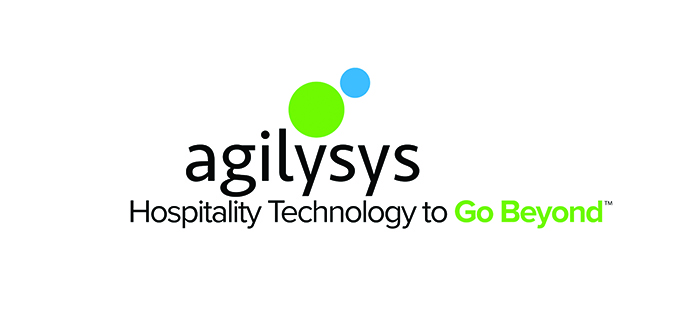
- Solutions
- Food & Beverage Ecosystem
Food & Beverage Ecosystem
Optimizing food & beverage operations and profitability demands a flexible, enterprise-class point-of-sale system. Is yours up to the task?
Go- Hospitality & Leisure Ecosystem
Hospitality & Leisure Ecosystem
From an individual location to an enterprise chain, get the most modern, mobile solution for managing your hospitality business
Go
- Inventory & Procurement Ecosystem
Inventory & Procurement Ecosystem
Designed to optimize foodservice and retail inventory and procurement operations for hotels, resorts, universities, restaurants and others.
Go
- Professional Services
Professional Services
Hospitality businesses are global, 24/7 operations with complex technology demands. You don’t have to go it alone.
Go
- Solution Studios
- Hotels
Hotels
Whether you operate a single boutique location or a large hotel chain, there’s an Agilysys hotel solution for you.
Go- Resorts
Resorts
Whether you operate a single boutique location or a large complex resort, your property is a unique operation that requires robust solutions supported by an experienced technology partner
Go
- Casinos
Casinos
You’re more than a gaming operation. You’re a full-service casino resort property and success isn’t about playing the odds, it’s about making the most of every revenue opportunity.
Go
- Tribal Gaming
Tribal Gaming
A leader in casino hospitality management solutions who respects the sovereignty of your nation.
Go
- Cruise Lines
Cruise Lines
Smooth seas ahead: technology solutions from Agilysys, a leader in cruise management systems.
Go
- Higher Education
- Corporate Dining
Corporate Dining
Identify emerging dining trends while aligning coverage with demand and capturing more revenue.
Go
- Healthcare
Healthcare
Delight patients & visitors, retain staff and grow margins with a suite of hospitality solutions for healthcare environments.
Go
- Life Plan Communities
- Foodservice Management
Foodservice Management
End-to-end foodservice management software solutions for optimum productivity and profitability.
Go
- Stadiums
- Restaurants
- Airports
Airports
Optimizing dozens of food & beverage outlets throughout your facility demands world-class POS performance combined with real-time operating insights.
Go
- Resorts
- Resources
- Articles
Articles
Access our library and read about the latest in emerging technology and other hospitality trends. Find tips and insights on accelerating business growth and improving guest satisfaction.
Go- Customer Stories
Customer Stories
Learn why so many businesses, small and large, partner with Agilysys for their hospitality technology needs.
Go
- Customer Videos
Customer Videos
Watch and learn what Agilysys customers have to say about their experiences with our solutions.
Go
- Product Resources
Product Resources
An in-depth collection of product information and datasheets. Read about the latest in hospitality technology features designed to solve the challenges faced by hospitality professionals around the globe.
Go
- Product Showcase
Product Showcase
Hear from industry professionals about the latest advancements, including tips and tricks, in hospitality and emerging technologies. Check out the library of demo videos and webinar recordings.
Go
- Webinars
Webinars
Watch and learn about the latest in successful technology trends and hear from hospitality professionals in this selection of interactive videos.
Go
- Industry Reports
Industry Reports
Important research and studies from across the hospitality industry. Find out what thought leaders are saying.
Go
- Customer Stories
- Company
- Leadership
- Solution Partners
Solution Partners
Agilysys has a broad collection of partners and APIs to help you assemble the perfect solution for you.
Go
- Our Customers
Our Customers
Discover how Agilysys customers like you are using our solutions to improve their business and guest experience.
Go
- Investor Relations
- News
- Events
Events
With the Agilysys commitment to 100% Hospitality solutions, we take industry events and conferences seriously. Please see where you can find Agilysys to learn more.
Go
- Career
- FAQS
FAQS
Go
- Solution Partners
- Support
- Contact Support
- Microsoft Patch Testing
Microsoft Patch Testing
See what Microsoft products and versions are currently support by Agilysys.
Go
- Payment Center
- RMA Requests
- Supply Order
Supply Order
Go
- Hospitality IQ
Hospitality IQ
Go
- Knowledge Center
Knowledge Center
Go
- Microsoft Patch Testing
- Blogs
- MyAgilysys
-
 Get a Demo
Get a Demo 877 369 6208
877 369 6208
×Home
☰- Explore
WHAT'S THE BUZZ IN HOSPITALITY?
Types of POS Systems: What Every Business Should Know
In todays fast-paced business environment, choosing the right Point of Sale (POS) system is more important than ever. A POS system is not just about processing transactions; it is a crucial tool that can streamline operations, enhance customer experiences, and drive profitability. From retail stores to restaurants, different POS systems are designed to meet the unique needs of various industries. Understanding the types of POS systems available can help businesses make the right choice to stay competitive and efficient. This article will explore the different types of POS systems and what every business should know to choose the right one.
1. Traditional POS Systems
Traditional POS systems, also known as legacy systems, are the original types of point-of-sale solutions. These systems consist of hardware like cash registers, barcode scanners, receipt printers, and cash drawers. They rely on software installed locally on the machine to process sales and manage inventory. Traditional POS systems are often used in small retail stores and businesses that don't need complex functionalities.
Advantages of Traditional POS Systems:
- Reliable and simple to use
- Well-suited for small-scale operations with limited inventory management needs
- More affordable upfront costs
However, traditional POS systems come with limitations. They usually don’t offer the flexibility and features of more modern solutions, and they lack cloud-based functionality, which means that data is stored locally. Additionally, updating these systems can require manual intervention and technical support.

2. Cloud-Based POS Systems
Cloud-based POS systems are increasingly popular due to their flexibility, scalability, and ease of use. Unlike traditional systems, cloud-based POS systems store data remotely on servers, making it accessible from any device with an internet connection. These systems are particularly beneficial for businesses that operate across multiple locations or require remote access to sales and inventory data.
Key Features of Cloud-Based POS Systems:
- Remote access to data from anywhere with an internet connection
- Automatic software updates and backups
- Scalable for growing businesses
- Integration with other cloud-based tools, such as accounting software or marketing platforms
These systems allow businesses to access real-time insights into sales, inventory, and customer behavior. For example, retail businesses can monitor inventory levels across various locations, while restaurant owners can review sales and staff performance remotely. The ability to access data from any device also means that staff can manage the system from tablets or smartphones, improving efficiency.

3. Mobile POS (mPOS) Systems
Mobile POS (mPOS) systems allow businesses to process payments and manage sales using mobile devices like smartphones or tablets. These systems are ideal for businesses that require mobility, such as food trucks, pop-up shops, or salons. mPOS solutions are often paired with Bluetooth-connected payment terminals, barcode scanners, and receipt printers for on-the-go transactions.
Benefits of Mobile POS Systems:
- Increased flexibility and mobility
- Ideal for businesses with a mobile or temporary setup
- Ability to process payments anywhere, which can boost sales
For example, a food truck owner can accept payments and process orders directly from their smartphone while interacting with customers, speeding up service and reducing wait times. Similarly, a boutique owner can check out customers while on the sales floor, reducing queues and enhancing the shopping experience.
4. Self-Service Kiosk POS Systems
Self-service kiosks are a growing trend, especially in industries like fast food, retail, and hospitality. These POS systems allow customers to place orders and make payments without interacting with a cashier or server. Self-service kiosks are common in fast food restaurants, hotels, airports, and even retail stores, where customers can browse products, place orders, and pay via touchscreen interfaces.
Advantages of Self-Service POS Systems:
- Reduce labor costs by allowing customers to handle their transactions
- Speed up service and reduce wait times for customers
- Provide customers with a more interactive and personalized experience

For example, in fast food restaurants, self-service kiosks can reduce wait times and increase order accuracy, as customers can directly customize their meals and review their order before completing the transaction. Similarly, in hotels, guests can check in, pay for services, and request amenities all through a self-service kiosk, improving efficiency and guest satisfaction.
5. Restaurant POS Systems
Restaurant POS systems are designed to meet the unique needs of the foodservice industry. These systems typically offer specialized features like table management, order tracking, and integration with kitchen display systems (KDS). Restaurant POS systems help restaurants manage orders, split checks, track inventory, and handle reservations.
Key Features of Restaurant POS Systems:
- Table and seat management
- Order customization (special requests, allergies, etc.)
- Integration with kitchen display systems (KDS) to streamline food preparation
- Detailed reporting on food costs, sales, and staff performance
For example, a restaurant POS system allows waitstaff to take orders directly from the table and send them immediately to the kitchen, ensuring faster and more accurate service. The system can also track the restaurant's inventory, helping managers monitor food waste and order supplies in a timely manner.
6. Integrated POS Systems
An integrated POS system combines various business functions into a single platform, such as sales, inventory, customer relationship management (CRM), and accounting. These systems are particularly useful for businesses with multiple departments, locations, or complex operations, such as large retail stores or multi-location restaurants.
Benefits of Integrated POS Systems:
- Streamline operations by unifying different aspects of the business
- Improve reporting and data analysis by consolidating all data in one place
- Automate processes like inventory management, sales tracking, and customer loyalty programs
For example, a multi-location restaurant chain can use an integrated POS system to manage reservations, process orders, track inventory, and offer loyalty rewards, all through one unified platform. Similarly, retailers can synchronize their sales, inventory, and e-commerce systems, ensuring consistent data across all channels.
7. Golf Course POS Systems
Golf courses have unique needs when it comes to POS systems. These operations require specialized systems that can handle tee time bookings, membership management, retail sales, and on-course purchases. Golf course POS systems often integrate with tee time software to make booking reservations, managing course availability, and handling payments more efficient.
Benefits of Golf Course POS Systems:
- Integrate with tee time management software for efficient booking and reservations
- Track and manage on-course purchases (food, drinks, merchandise)
- Offer customer-facing apps or online booking tools for added convenience
For example, a golf course POS system allows staff to manage tee time reservations, track customer purchases, and offer promotions all through one interface. Integration with tee time management software ensures seamless booking and payment processing for players, whether they are reserving online or at the course.
Conclusion
Selecting the right POS system for your business is essential for streamlining operations and driving profitability. With so many different POS systems available, it's crucial to consider your specific business needs. Whether you're managing a small retail shop, running a restaurant, or overseeing golf course operations, there's a POS system designed to help you maximize efficiency, enhance customer service, and boost sales. By understanding the features and benefits of each type of POS system, businesses can make informed decisions that align with their goals and ensure success in an increasingly competitive market.

The 2024 Global Hospitality Study
Download Study
Visit Agilysys At These Events
Learn More
2025 Hospitality Industry Conferences You Shouldn't Miss
Read MoreCategories
- Contact Support
- Leadership
- Articles
- Hotels
- Food & Beverage Ecosystem





